
Madrygal-Revista de Estudios Gallegos
Scope & Guideline
Exploring the Depths of Galician Heritage
Introduction
Aims and Scopes
- Galician Linguistics and Dialectology:
The journal emphasizes the study of the Galician language, its dialects, and linguistic evolution, providing insights into language standardization and dialectological characteristics. - Cultural and Historical Analysis:
There is a strong focus on historical narratives, regionalist movements, and cultural identity in Galicia, examining the interplay between literature and socio-political contexts. - Literary Criticism and Theory:
The journal publishes works that engage with literary criticism, exploring the contributions of prominent Galician authors and their impact on both local and global literary landscapes. - Interdisciplinary Approaches:
Research often incorporates interdisciplinary methodologies, linking literature, history, linguistics, and cultural studies to provide a comprehensive understanding of Galician studies. - Gender Studies and Social Issues:
The journal addresses themes related to gender, identity, and social issues within the Galician context, reflecting on the roles and representations of women in literature and culture.
Trending and Emerging
- Contemporary Galician Literature:
There is a noticeable increase in research focusing on contemporary Galician authors and their works, reflecting the current literary scene and its engagement with modern themes. - Dystopian and Sci-fi Narratives:
Emerging themes of dystopian and science fiction narratives within Galician literature are becoming more prominent, indicating a shift towards speculative fiction that critiques contemporary societal issues. - Intersections of Music and Literature:
Studies examining the relationship between music and literature, particularly in the context of Galician cultural expressions, are on the rise, showcasing the interdisciplinary nature of cultural studies. - Environmental and Ecological Criticism:
There is a growing trend towards environmental and ecological criticism within Galician studies, reflecting global concerns about climate change and sustainability as they relate to local narratives. - Migration and Diaspora Studies:
Research focusing on the Galician diaspora and migration, particularly in relation to linguistic identity and cultural preservation, is increasingly relevant in understanding contemporary Galician society.
Declining or Waning
- Traditional Folklore Studies:
Research centered on traditional folklore and its contemporary relevance has seen a decline, possibly due to a shift towards more modern interpretations of Galician culture. - Historical Linguistics:
The exploration of historical linguistics, particularly in relation to ancient Galician texts, seems to be receiving less attention, as current studies focus more on contemporary language use and sociolinguistic dynamics. - Colonial and Postcolonial Studies:
Themes related to colonial and postcolonial analysis within the Galician context are becoming less frequent, suggesting a potential narrowing of focus towards more local and immediate cultural issues.
Similar Journals

Anclajes
Connecting Cultures Through Scholarly InsightAnclajes is a prominent academic journal dedicated to the fields of Cultural Studies, Linguistics, and Literature, published by the UNIV NACIONAL LA PAMPA, FAC CIENCIAS HUMANAS. With both print (ISSN 0329-3807) and electronic (E-ISSN 1851-4669) formats, the journal has embraced an Open Access model since 2010, greatly enhancing its accessibility and reach to a global audience. Based in Argentina, Anclajes provides a platform for innovative research and critical discourse, contributing significantly to the understanding of cultural phenomena and literary theories. In recent years, the journal has established itself with a Scopus rank placing it in the top 30% of Literature and Literary Theory and the top 57% of Cultural Studies, as indicated by its quartile rankings for 2023. With issues converging from 2012 to 2024, Anclajes continues to foster scholarly communication and serves as an essential resource for researchers, students, and professionals seeking to explore the dynamism of human culture and expression.
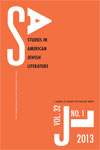
Studies in American Jewish Literature
Fostering Critical Dialogue on Jewish Cultural NarrativesStudies in American Jewish Literature, published by Penn State University Press, is a premier academic journal that delves into the rich tapestry of Jewish literary expression in America. With an ISSN of 0271-9274 and an E-ISSN of 1948-5077, this journal serves a vital role in the fields of Literature and Literary Theory, Cultural Studies, and Anthropology, as evidenced by its placement in the Q1 to Q3 quartiles across various categories in 2023. The journal is a key platform for researchers, professionals, and students interested in exploring the intersection of Jewish identity and American literature, contributing to a deeper understanding of cultural narratives and societal impacts. The publisher's commitment to scholarly excellence ensures that each issue is meticulously curated, showcasing innovative research and critical analysis. While not open access, the journal provides essential insights for anyone engaged in the study of Jewish literature or the broader cultural dynamics at play in American society. Stay informed on contemporary themes and historical contexts that shape literary discourse through this commendable publication.
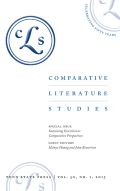
COMPARATIVE LITERATURE STUDIES
Championing Interdisciplinary Research in LiteratureComparative Literature Studies is a distinguished journal published by Penn State University Press, focusing on the diverse and evolving field of comparative literature. With an ISSN of 0010-4132 and an E-ISSN of 1528-4212, this quarterly journal has been a critical platform for scholarly dialogue and interdisciplinary research since its inception in 2000. The journal proudly ranks in the Q3 category for Cultural Studies and Q2 for Literature and Literary Theory (2023), showcasing its significant impact within these domains. Notably, it ranks #214/1106 in Literature and Literary Theory according to Scopus, placing it in the 80th percentile—highlighting its relevance and quality in the global academic landscape. Despite its traditional subscription model, the journal remains a crucial resource for researchers, professionals, and students keen on exploring the intersections of cultures, texts, and histories. By publishing cutting-edge research and critical essays, Comparative Literature Studies aims to expand the horizons of literary analysis and foster innovative scholarly exchanges.
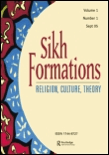
Sikh Formations-Religion Culture Theory
Unpacking the Intersections of Religion, Culture, and TheorySikh Formations: Religion, Culture, Theory is a premier academic journal published by Routledge Journals, Taylor & Francis Ltd, focusing on the intersection of Sikh studies, religious theory, and cultural discourse. With its ISSN 1744-8727 and E-ISSN 1744-8735, this journal is recognized for its significant contributions to the fields of Religious Studies and Cultural Studies, currently ranking in the top quartiles, Q1 and Q2 respectively, highlighting its scholarly impact. The journal covers a broad spectrum of topics related to Sikhism, offering a platform for researchers and professionals to explore new theoretical perspectives and cultural analyses. The journal's extensive archive, spanning from 2005 to 2024, ensures a rich resource for academic inquiry. With access options tailored for various researchers and a commitment to academic excellence, Sikh Formations continues to play a vital role in enriching the understanding of Sikh culture and its global implications.

Anaquel de Estudios Arabes
Bridging Cultures Through Academic InquiryAnaquel de Estudios Arabes is a distinguished academic journal dedicated to the field of Arab studies, offering a platform for original research and critical discussions that span various disciplines. Published by UNIV COMPLUTENSE MADRID, SERVICIO PUBLICACIONES, this journal has established itself as a vital resource since it became Open Access in 2014, facilitating global dissemination of knowledge. With an ISSN of 1130-3964 and E-ISSN 1988-2645, the journal operates from Madrid, Spain, and supports a diverse range of topics related to history, linguistics, literature, and religious studies, earning esteemed Q2 and Q3 rankings in these categories as of 2023. Researchers, professionals, and students alike benefit from the journal's commitment to quality, reflected in its Scopus rankings across several related fields. As it approaches a pivotal period from 2019 to 2024, the Anaquel de Estudios Arabes continues to contribute significantly to the intellectual landscape of Arab studies, engaging scholars who seek to deepen their understanding of the complex cultural and linguistic heritage of the Arab world.

Kritika Kultura
Unveiling innovative scholarship in cultural studies and criticism.Kritika Kultura is an esteemed journal published by Ateneo de Manila University, dedicated to advancing the fields of cultural studies, literary criticism, and post-colonial theory. With its ISSN 2094-6937, this journal serves as a vital platform for scholars and practitioners interested in interdisciplinary research that analyzes the complexities of culture and literature within various socio-political contexts in the Philippines and beyond. Although currently not operating under an open-access model, Kritika Kultura is committed to fostering academic dialogue and disseminating significant research findings, making it an essential resource for researchers, professionals, and students alike. By showcasing innovative approaches and scholarly discourse, the journal contributes to the rich tapestry of Filipino and global academic thought, reinforcing its importance in contemporary scholarship.

BULLETIN HISPANIQUE
Illuminating the Pathways of Hispanic ScholarshipBULLETIN HISPANIQUE, published by PRESSES UNIV BORDEAUX, is a prominent academic journal dedicated to the interdisciplinary exploration of literature, linguistic studies, and historical analysis related to the Spanish-speaking world. Since its inception in 1972, the journal has established itself as a vital resource for researchers and scholars, achieving notable recognition across various categories—most recently characterized as Q2 in History, Q3 in Linguistics and Language, and Q1 in Literature and Literary Theory for the year 2023. Though it operates under traditional access models, BULLETIN HISPANIQUE maintains a commitment to scholarly excellence, offering insightful articles that contribute to the rich tapestry of cultural and linguistic discourse. With its Scopus rankings reflecting significant academic engagement, the journal serves as an essential platform for dialogue and discovery in the arts and humanities, appealing to a diverse audience of students, professionals, and academics committed to advancing knowledge in these vital fields.
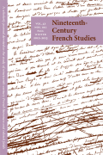
NINETEENTH-CENTURY FRENCH STUDIES
Fostering Innovative Research in French StudiesNINETEENTH-CENTURY FRENCH STUDIES, published by University of Nebraska Press, is a premier academic journal dedicated to the exploration and analysis of French literature and culture from the 19th century. Established as a vital resource for scholars in the field, this journal is recognized for its contribution to literary studies, holding a commendable Q2 rating in the 2023 category of Literature and Literary Theory, reflecting its academic rigor and relevance. With an ISSN of 0146-7891, it offers a platform for innovative research and scholarly discourse, delving into critical topics that shape our understanding of the era. Although it does not currently operate as an open-access journal, its impactful research is instrumental in guiding literary analysis within the arts and humanities. As it continues its publication journey, converging from 2001 to 2024, NINETEENTH-CENTURY FRENCH STUDIES remains essential for researchers, professionals, and students aiming to gain deeper insights into the complexities of 19th-century French literature.
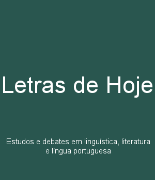
Letras de Hoje-Estudos e Debates em Linguistica Literatura e Lingua Portuguesa
Bridging Theory and Practice in Linguistics and LiteratureLetras de Hoje-Estudos e Debates em Linguistica Literatura e Lingua Portuguesa, published by EDITORA UNIV PONTIFICIA UNIV CATOLICA RIO GRANDE SUL-EDIPUCRS, is a leading academic journal in the fields of linguistics, literature, and the Portuguese language. With an esteemed history dating back to 1967, it has proudly maintained an Open Access model, making significant scholarly contributions accessible to researchers, professionals, and students worldwide. The journal serves as a crucial platform for the exchange of innovative ideas, critical discussions, and extensive research findings targeting both theoretical and applied dimensions of language studies. The commitment to fostering community engagement and interdisciplinary dialogue underscores its importance within the academic landscape, encouraging submissions that challenge conventional paradigms and explore the complexities of Portuguese linguistics and literature. For those involved in these dynamic fields, Letras de Hoje remains an essential resource for advancing knowledge and supporting scholarly discourse.

ESTUDIOS FILOLOGICOS
Advancing the Frontiers of Linguistics and LiteratureESTUDIOS FILOLOGICOS is a prestigious journal specialized in the fields of Linguistics and Literature, published by UNIV AUSTRAL CHILE. With an ISSN of 0071-1713 and an E-ISSN of 0717-6171, this journal serves as a vital platform for scholars, researchers, and students to disseminate their findings and foster academic discourse in philology and its related disciplines. Renowned for its rigorous peer-review process, ESTUDIOS FILOLOGICOS holds an impressive position with a Q2 ranking in Linguistics and Language and a Q1 ranking in Literature and Literary Theory as of 2023. Situated in Valdivia, Chile, and spanning from 2007 to 2023, this journal not only contributes significantly to the academic community but also engages with diverse voices in the humanities. By maintaining a balanced focus on high-quality research and accessible discourse, ESTUDIOS FILOLOGICOS continues to play an essential role in promoting scholarly information and engagement within the fields of language and literature.